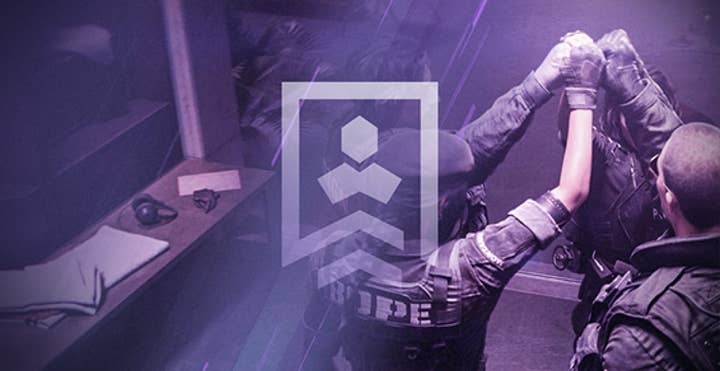Ubisoft asks players to stop being toxic | This Week in Business
We participated in the publisher's corporate training-style Fair Play Program so you don't have to
The Anti-Defamation League this week released its annual survey on hate and harassment in online gaming, and unsurprisingly, it remains a problem.
STAT | 86% - The percentage of US online game players aged 18-45 who had experienced harassment in the past six months, a number that has increased for four straight years now.
Read the story for a bunch more deeply concerning stats about how online gaming can be a sewer full of excrement for kids and adults alike to splash around in.
The ADL report ends with various calls to action. It has seven points for the games industry to handle, two suggestions for government, three more for civil society as a whole, and finally three for caregivers and educators.
And yet nowhere in the report does the ADL think to say, "Hey, hatemongers and serial harassers, stop mongering that hate and harassing serially."
Thankfully, we have Ubisoft to pick up the ADL's slack here with its Fair Play Program, which it also launched this week.
The Fair Play Program's aim – to eliminate toxicity in online gaming – is laudable. It's a goal shared by people in every corner of this industry, which is good because it's also a very complex thing to achieve and it's difficult to say with certainty what approach (or combination of approaches) will yield the best results.
In light of that, I am generally inclined to treat any such effort as a "the more, the merrier" situation. I'm also sure the people who put Ubisoft's Fair Play Program together are doing their best and genuinely want a happier, healthier online environment for players. And the last thing I want to do is discourage people trying to make this industry a better place.
So in deferrence to everybody who keeps telling me to "be positive," Ubisoft gets a B+ for effort here, even if the grade for execution is... lower.
Currently in an open beta testing phase, the Fair Play Program is a collection of tips, factoids, YouTube videos, and quizzes targeted at gamers, with the goal of getting them to cut down on toxic behaviors. There are five different sections of the program that will take a total of 22 minutes to complete, going by Ubisoft's calculations.
The whole thing gives off the vibe of a corporate workplace training module on sexual harassment or insider trading. But instead of paying people to go through the program the way employers do with corporate training, Ubisoft is effectively asking gamers who perpetrate toxic behavior to spend some time going through this program out of the goodness of their own hate speech-spewing hearts.
Ubisoft also requires anyone going through the Fair Play Program to be logged in with an Ubisoft account so the company can process their personal data, because why wouldn't you put up every hurdle possible when you're trying to do something good/padding out your direct marketing mass mailing list?
QUOTE | "As part of the Ubisoft Connect ecosystem, the Fair Play Program requires a connection through a Ubisoft Connect account. The Program is in beta and as such, our teams need to understand how our players use this platform in order to keep improving it and make sure we provide the most relevant advice and information to our players. Player data is collected and processed in the same way as for other platforms and games of the ecosystem." – An Ubisoft representative explaining the decision to require a log-in and what the company will do with the data it collects.
Even though it required creating a new account so Ubisoft could glean doubtlessly valid and actionable insights from how I was taking their personality quizzes and watching their YouTube videos, I did it for the sake of journalism and engaged with the Fair Play Program to see what I could learn.
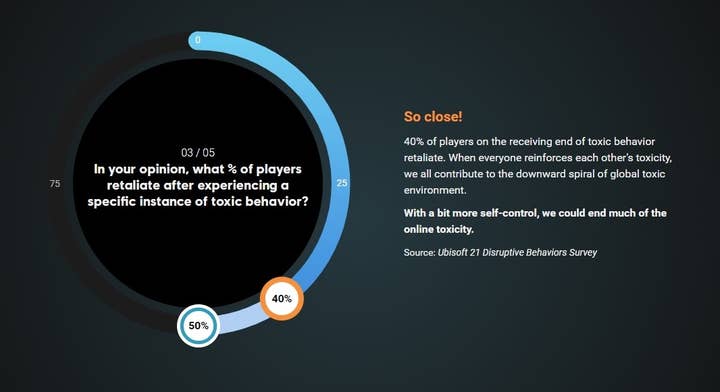
The first part of the program was a five-question quiz about toxic behaviors in online games. I went 0-for-5 on the opening quiz, which is weird because every question was prefaced with "In your opinion" but apparently there was only one right answer and it was always a percentage between 0 and 100 that the user was supposed to guess. It's a weird way to present a handful of "Did you know?" factoids, but whatever.
The second part of the Fair Play Program was also a quiz, but this one was more like a personality test, covering "Your Personal Triggers." This was a multiple choice test where the user was asked on a four-point scale how much they agreed or disagreed with a series of 15 statements like "I don't like it when teammates don't follow what we've agreed upon" or "After a bad day, I like to play video games to sublimate my upset feelings."
After that quiz, the website gives you a graph with the various offenses grouped into five general categories of things that set people off – failure, miscommunication, provocation, mood issues, and perception of unfairness – and then shows you "your main reason to tilt." As for what you should do with this information, it simply tells you to "stay vigilant when" that reason to tilt comes up.
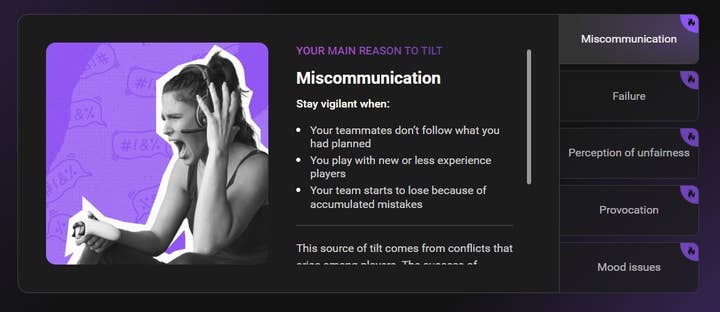
It's a gesture in the direction of encouraging worthy ideas like self-reflection, mindfulness, and anger management, but without much in the way of substance behind it.
The third and fourth sections of the program are strictly YouTube videos. First there's one where pro players from TeamSoloMid explain that they play better when they keep a cool head and don't get worked up, and then there's a whole playlist of eight short videos on how to deal with toxic behavior in games, much of which boil down to "don't feed the trolls" and reporting bad actors, an idea Ubisoft hammers on repeatedly.
QUOTE | "At Ubisoft, many people spend every day reading and taking action against toxic players. Be assured that you will be supported. You have action taken against your opponent. Document, block, and report." – The narrator in one of Ubisoft's Fair Play Program videos.
Yes! Report wrongdoing to Ubisoft and you can sure it will be acted upon and you will be supported, even though that's kind of the opposite of what the company's known for. And sure, the person running the show has all but admitted that he sided with abusers against the people who reported their wrongdoing.
QUOTE | "It has now become clear that certain individuals betrayed the trust I placed in them, and didn't adhere to Ubisoft's shared values." – Ubisoft CEO Yves Guillemot, explaining to an investor after the scandals broke in 2020 that he was the real victim all along.
It is also not lost on me that the Fair Play Program is Ubisoft putting the onus for cleaning up online spaces squarely on the players.
QUOTE | "Taking their bait might turn you toxic and you could get sanctioned instead of them, handing trolls a double win. In these situations, tell yourself that remaining calm and polite is a total badass move doing pulls the rug from under trolls." – The narrator in one of the Fair Play Program videos advises ignoring trolls.
Once you've completed the first four parts of the program, you can enroll in the final step: Start Anew.
QUOTE | "To make this training count, let's take a commitment. Spotlight the root of your tilt, select a behavior you want to change and plan your next strategy to reach that goal." – Ubisoft's call to action for people to clean up online gaming amounts to nothing more than asking them to stop making online gaming so miserable for everyone else.
The commitments Ubisoft asks people to make range from vague to inconsequential. For example, if your toxic behavior is rage quitting or going away from the keyboard, you can pledge to breathe deeply three times.
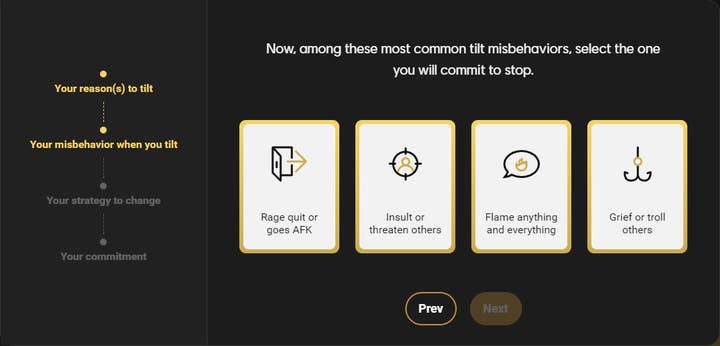
If your problem is a frustration with losing, you can pledge to "mute the others," "find a new objective for next turn" or "play game in a different mode."
I'll note here that all of those suggestions keep you playing the game. Stepping away and not playing the game for a while – perhaps even sublimating your upset feelings with a more calming hobby or a game that does not involve heated competition with jerks – is never suggested. Presumably that's because, as obvious and healthy as those alternatives may be, they would hurt Ubisoft's engagement metrics, and no improvement to mental health is worth that.
There were likewise no options to commit to cutting down on the white supremacy, Holocaust denialism, or racist coronavirus comments that the ADL survey found to be growing in popularity in online spaces.
STAT | 17% - Percentage of Rainbow Six: Siege-playing adults who reported encountering white supremacist extremism in the past six months of playing the game, according to the ADL. (Depressingly, that's better than many other top games; Call of Duty earned "top" marks in this category, with 44% of players recently exposed to white supremacy during online play.)
While it's true that habitually toxic players are outnumbered by those who are toxic on rare occasions – otherwise responsible players may have a one-off episode of bad behavior – I question how many of the people who would proactively volunteer to go through the Fair Play Program and earnestly commit to Starting Anew (or even playing in a different game mode) also double as sources of hate and harassment in online games.
I don't doubt it's well-intentioned, but Ubisoft's Fair Play Program is entirely focused on what players can or should do to address a problem, and says nothing of Ubisoft's own obligation here.
To be fair, Ubisoft has taken other steps to combat toxicity beyond asking end users to fix it. For example, Ubisoft also has the recently announced Zero Harm in Comms project with Riot Games to create AI to take care of the problem for them, which as our own Rob Fahey pointed out, may cause more harm than good.
And we would be remiss to leave out Ubisoft's last big automated moderation effort, a 2018 update for Rainbow Six Siege that saw players instantly banned for using racial slurs in text chat. It was apparently super effective, but because it kicked offenders mid-match, it left their otherwise rule-abiding teammates at a disadvantage.
So after a few months, the auto-ban was scrapped in favor of an after-the-fact review process. Because Ubisoft can overlook racial slurs peppering text chat, but it draws the line at people being in any way inconvenienced by an effort to course correct a community culture it allowed to get out of hand in the first place.
That characterization – much like the above criticism of the Fair Play Program – may not seem entirely fair, like I'm putting it all on Ubisoft to solve a sweeping problem endemic to virtually every gaming community.
And yes, within Ubisoft's games, I'm doing exactly that. Because ultimately, Ubisoft's online communities are Ubisoft's responsibility.
Ubisoft created these games. Ubisoft determined the ways players can interact. Ubisoft set the policies by which the communities run. Ubisoft makes the decisions on how to enforce those policies. And most importantly, Ubisoft is the one profiting from these communities' continued existence.
While we all might have a part to play here, we should not for a second entertain the idea that keeping a company's gaming communities clean is anyone's actual responsibility but that company's.
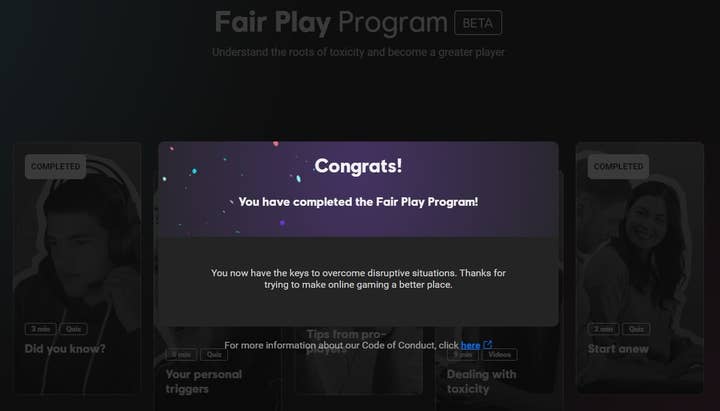
The Rest of the Week in Review
STAT | 0 – Out of the 14 companies we looked at for our annual conflict minerals report, none of them showed improvements on their responsible sourcing efforts over last year. Companies like Sony and Microsoft did significantly worse, while Amazon and Valve continued to show minimal and no interest, respectively, in the entire subject.
QUOTE | "Microsoft has already shown that it can and will withhold content from its gaming rivals." – In filing suit to stop Microsoft's acquisition of Activision Blizzard, FTC Bureau of Competition director Holly Vedova points to the acquisition of Zenimax, where Microsoft assured people it didn't make the deal to keep games off other people's platforms and then changed its tune on exclusivity literally as soon as the acquisition had closed.
QUOTE | "Blocking our acquisition would make the gaming industry less competitive and gamers worse off. Think about how much better it is to stream a movie from your couch than drive to Blockbuster." – In a Wall Street Journal guest editorial, Microsoft vice chair and president Brad Sams' response to concerns that the Activision Blizzard acquisition could give its nascent streaming strategy an anti-competitive edge over the existing market leader and drive it out of business is to draw parallels to a very recent example of that exact thing happening.
STAT | 10 – Then number of years Microsoft has pledged to keep Call of Duty releasing on Nintendo platforms and Steam if the Activision Blizzard acquisition goes through.
QUOTE | "Valve CEO Gabe Newell commented to the press saying, 'Microsoft has always followed through on what they told us they would do so we trust their intentions… we think Microsoft has all the motivation they need to be on the platforms and devices where Call of Duty customers want to be.'" – In an internal email to employees, Activision Blizzard senior VP of litigation, regulatory, and public policy law Jeb Boatman manages to not actually mention Kotaku when citing original reporting done by Kotaku, which has been so critical of the publisher and CEO Bobby Kotick that Kotick reportedly suggested buying the outlet to change the public narrative around the company.
Instead of linking to the Kotaku article, Boatman then embedded a tweet from Call of Duty fan account CharlieIntel that had a screencap of the relevant reporting, but no link. So deliciously petty.
QUOTE | "We applaud Microsoft for remaining neutral through this process and letting workers decide for themselves whether they want a union." - CWA president Christopher Shelton cheers the Xbox maker for allowing an uncontested unionization vote for about 300 Zenimax QA employees across Maryland and Texas some time in the next four weeks. Earlier this year the union dropped its opposition to the Activision Blizzard acquisition in exchange for a non-interference pledge.
QUOTE | "You're like, 'Man, I feel like I'm working for the bad guys. I feel like any work I do is tainted by this name." – In a story about the troubled development of Diablo 4, a former Blizzard Albany employee describes the impact of Activision Blizzard's numerous scandals and lawsuits on employee morale, in particular the promotion of Blizzard Albany/Vicarious Visions studio head Jen Oneal to co-leader of Blizzard, followed months later by her resigning because the company refused to pay her the same amount as her male co-leader.
Believe it or not, there was news that didn't have anything to do with Microsoft or Activision Blizzard this week, and I'm not just talking about the actually impressive lineup shown off at The Game Awards last night.
STAT | 9 – The number of stories we've written since July about layoffs at gaming media outlets. This week IGN was added to the list of outlets cutting staff, joining Polygon, GameByte, Game Informer, Future, Fanbyte, G4 (twice), and Vice.
QUOTE | "We are aware of the comments made by our previous creative director on Days Gone regarding his personal view on the critical reception of our intellectual property. Bend Studio does not share his sentiment, nor does it reflect the views of our team." – Bend Studio felt the need to release a statement to further distance itself from its former creative director John Garvin, who this week tweeted (and then deleted) a post saying the game didn't get universal praise because of technical problems, reviewers who didn't actually play the game, and "woke reviewers who couldn't handle a gruff white biker looking at his date's ass."
Last year Garvin appeared on David Jaffe's podcast and confirmed that Bend Studio fired him because he was a "disruptive" personality. He also admitted he was "not a great people person," yelled at others in the studio, and was put through training to be a better boss multiple times.
STAT | 4 entire years – How long it took Epic Games to roll out kids' accounts with parental controls on voice chat, spending, and social media on the Epic Games Store. It's not great that a company that has benefitted so much from young players with Fortnite would take so long to implement even the most basic of protections for them on its storefront.
STAT | 2 – The number of times Sonic the Hedgehog developer Yuji Naka has been arrested for insider trading in the past two months.
